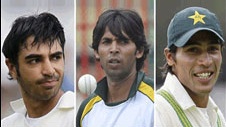![The-Sports-Lawyer[1]](http://www.sportingintelligence.com/wp-content/uploads/2011/03/The-Sports-Lawyer11.jpg) THE SPORTS LAWYER is actually a posse of Britain’s brightest lawyers, from the Sport & Media team at the UK law firm, Thomas Eggar, who will be contributing features, analysis and insight on a regular basis on the key sports law issues of the day. In TSL’s latest column, Andrew Nixon discusses the issue of corruption in sport.
THE SPORTS LAWYER is actually a posse of Britain’s brightest lawyers, from the Sport & Media team at the UK law firm, Thomas Eggar, who will be contributing features, analysis and insight on a regular basis on the key sports law issues of the day. In TSL’s latest column, Andrew Nixon discusses the issue of corruption in sport.
x
x
7 November 2011
Earlier this year, the International Cricket Council (the ICC) banned three Pakistani cricketers (Mohammad Amir, Salman Butt and Mohammad Asif) following allegations that they had taken steps to fix certain aspects (in particular relating to the bowling of no balls) of the Lord’s Test last August. Those bans were for 5 years, 10 years and 7 years respectively.
The players’ only route of appeal was to the Court of Arbitration for Sport (CAS). However, CAS agreed to stay those proceedings pending the outcome of a criminal investigation into the match. Those investigations led to charges against all three players (as well as the agent), and last week led to convictions for conspiracy to accept corrupt payments. It is a decision that clearly has significant ramifications not just for cricket, but all sports.
Comment
The case once again highlights the issue of corruption in sport. Unpredictability underpins all sport, from amateur to elite level. Corrupt practices are designed, to varying degrees, to affect the natural outcome of a sporting contest, or parts of a sporting contest, which should flow from the relative abilities of the competitors and it must be guarded against. Corruption takes on various guises, from doping, to fake substitutions, to betting scams and governing bodies will punish offenders, often with bans that can effectively terminate careers.
Generally, the law of the land will not intervene, as more often than not the sanctions imposed by the governing bodies are sufficiently severe and proportionate. However, clearly when there are allegations of corruption, and that corruption involves allegations that money was accepted to take certain actions in respect of a sporting contest, the involvement of the relevant criminal authorities becomes all the more likely.
One of the biggest problems has been the popularity of betting on sport (whether legal or illegal gambling) and it has always brought with it the threat of match or race fixing because of the considerable sums of money involved, and it is not just cricket that has been tainted. There is little doubt that last week’s verdict will (or should) encourage all sports to review their anti-corruption procedures, both at national and international board levels.
However, the reality is that sport can only do so much and not all sports have the financial or personnel capacity to create task specific anti-corruption departments. Perhaps one of the answers is to adopt a collective and centralised approach to match-fixing, led by the government.
In this country, the government’s default view has traditionally been that betting corruption in sport falls outside of its remit. Despite lobbying from a number of high profile NGBs, including the England & Wales Cricket Board, the Rugby Football Union and League, the Lawn Tennis Association and the British Horseracing Regulatory Authority, it is a stance the government has not waivered on.
The government recommendations place the responsibility directly onto the sports themselves to deal with corruption, but do not take into account the huge costs involved with that task. The Gambling Commission has for example introduced statutory provisions for information sharing, in the form of Licence Conditions and a Code of Practice to run alongside the Gambling Act 2005 and a Ten Point Plan was also published in 2006, but in truth this puts the onus on sports governing bodies to include provisions in their rules and regulations to govern the behaviour of participants in relation to betting.
Broadly speaking, most sports have taken these recommendations on board and indeed, the majority of sports now prohibit participant betting. However, the non-interventionist approach to gambling corruption is at odds with the Government’s ‘hands on’ stance on doping.
Both fixing and taking drugs involve similar thought processes and objectives, namely to influence the outcome of a sporting contest by corrupt means, but match-fixing is a practice which in many ways is more of a threat to the ethos of sport than doping, because it involves cheating to lose rather than cheating to win.
There is good that can come out of these convictions, sad as they are for the sport of cricket. However, leaving sports governing bodies to address betting corruption through their own self regulatory measures is not a sufficiently robust way of dealing with this issue.
Protecting the integrity of sport (and indeed its commercial value) is imperative.
Without ‘uncertainty of outcome’ sport’s viability comes under threat and in the post pay TV and globalisation era, along with the advent of a more sophisticated and technologically driven betting market, it is a very real threat. The establishment of a Sports Betting Intelligent Unit, as recommended by Rick Parry, represents step in the right direction but arguably more needs to be done.
Sports shorts
Betting levy agreed
Bookmakers have finally reached agreement with the racing industry over the annual horseracing levy. The deal, which was agreed minutes before the deadline, will provide racing with a projected £72.4m in the 12 month period from April 2012. Had the deal not been reached, the government would have been forced to determine the levy for the second year running.
Andrew Nixon is an Associate in the Sport and Media Group at Thomas Eggar.
Follow us on Twitter at – thesportlawyer









